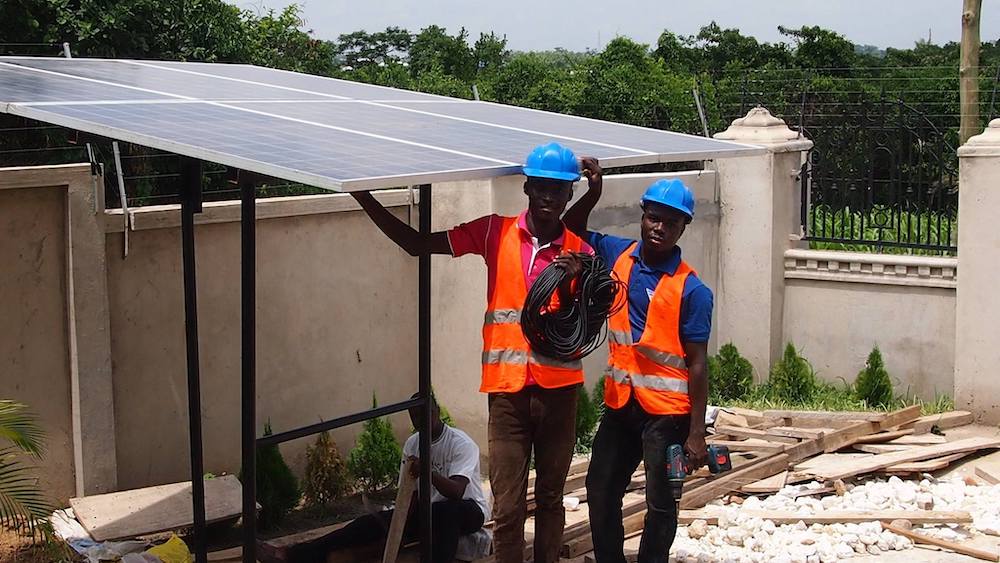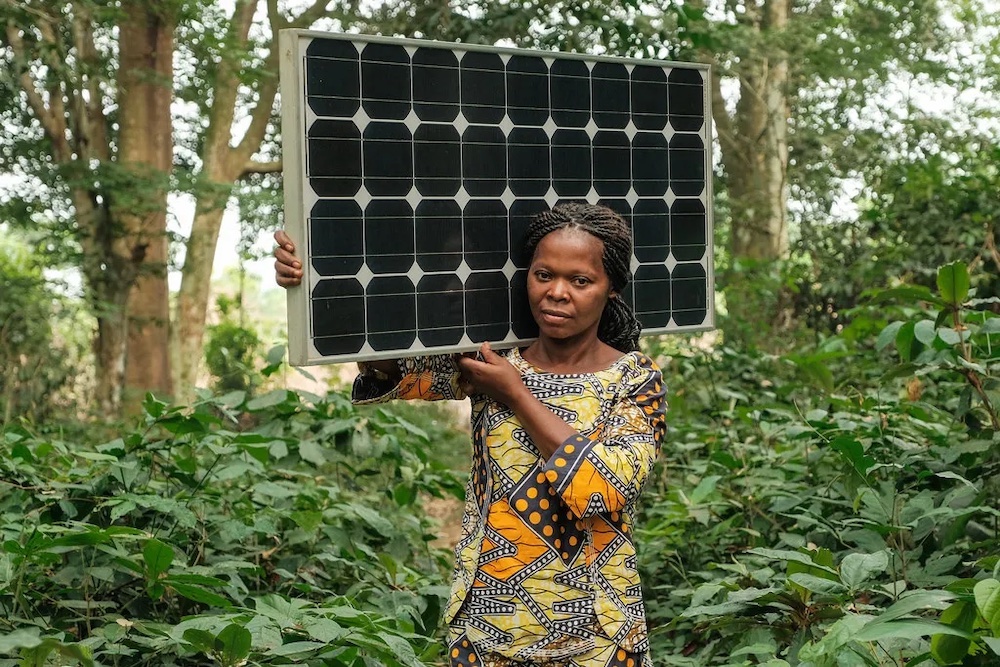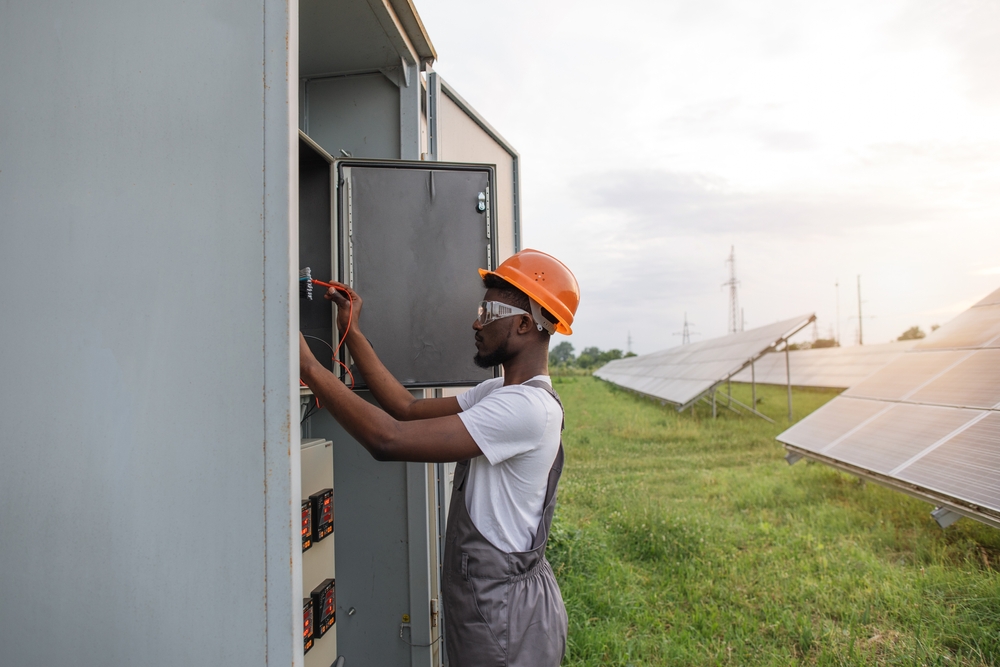ImpactAlpha, February 1 – National commitments to decarbonize economies and mitigate climate change are spurring a global green jobs boom, as countries race to add renewable energy capacity, build electric vehicles and supportive infrastructure, and sequester, capture and count carbon.
“We have an opportunity to turn the climate crisis into an opportunity for our continent,” Kenya’s President William Ruto declared at the Africa Climate Summit last fall. One of Africa’s biggest assets, he said: “our young people”.
The continent of 1.2 billion people has a lot of work to do to prepare its workforce for a green future. More than 70% of Africans are younger than 30. Most earn a living in the informal sector. To date, there are few multinational or national workforce skills initiatives that focus on the green economy.
To tap the climate jobs opportunity, entrepreneurs, investors and NGOs are themselves launching programs, starting with the most tangible need: clean energy.
“A lot of the conversation in Africa driving the push has been related to clean energy and the ambition to promote better, broader access to energy,” explains Paul Breloff, founder of Nairobi-based talent search firm Shortlist, whose programs include upskilling and job placement for women and youth in the energy sector.
Africa’s early pay-as-you-go solar sector gave rise to companies like d.light, Sun King, Bboxx, Zola and M-Kopa, which are now rapidly expanding their products, services and markets through partnerships with energy utilities and governments. Their business models are powered by networks of thousands of local field agents and technicians. Much of Africa’s current green jobs demand comes from these companies and others working in renewables.
“Now we’re also seeing demand emerge from a range of broader climate-related fields like e-mobility, food systems and more,” observes Breloff. These “will drive even more future opportunities.” Think solar technicians, turbine engineers, environmental and social consultants, carbon finance experts, and specialized skills needs for green production and manufacturing.
Meeting today’s demand
Skills demand from clean energy companies inspired Shortlist’s first green skills program in 2019. The company partnered with the UK development agency FCDO (then DFID), the African Management Institute and Carbon Trust to introduce young people to entry-level work opportunities in the clean energy sector.
“The primary goal was making sure that clean energy companies were not being held back by hiring challenges by making the pool of qualified young professionals bigger,” explains Breloff.
The Off-Grid Talent Initiative provided training and subsidized internships to more than 400 people at 35 companies in nine countries. More than 90% of trainees were hired full-time by the companies they interned with.
“Of those that have since left, the majority have stayed in the clean energy sector,” says Breloff. “We see that as really promising as we try to expand the number of people working in this space.”
It has since expanded the program, now called the “Energy Access Talent Initiative,” to train and employ more than 1,600 young people.
Shortlist is also working in partnership with the Global Energy Alliance for People and Planet on a jobs initiative that focuses on women. Women for Green Jobs is training and placing 750 women in Ethiopia, Kenya, Malawi, Nigeria, Sierra Leone and Uganda in jobs with clean energy companies.
The initiative, says Breloff, “centers on job placement, but also considers other interventions to promote more equitable representation of women in the workforce and their success in these jobs.” That includes mentorship and promotion programs, and technical assistance to shift company policies and practices for greater gender equity.
Last year, the company rolled up its green jobs programs into a jobs board and training and resource center to support more green jobs employers and seekers
Inclusive workforce
The energy, transportation and other transitional sectors are predominantly male. Building a more inclusive green workforce requires understanding different population’s unique preferences and needs.
KawaSafi Ventures, an Acumen spin-out fund that invests in clean energy access, partnered with Nairobi-based Strathmore University to train female solar technicians. It learned that women tend to gravitate towards sales positions over technical roles due to the commissions, flexibility and the agency that comes with sales.
“The initial mandate of the training was for technical roles, because that’s where there was a significant gap,” explains KawiSafi’s Angela Muraguri. “As we started designing the curriculum, we realized we needed to expand the training to include some non-technical skills.”
The program was adapted to incorporate communication, budgeting and financial management skills.
More than 200 mostly rural women completed the free two-week program to become licensed electrical workers. They received a stipend and accommodation during the program. Trainees have gone on to work for KawiSafi portfolio companies like d.light, Bboxx and Sistema Bio.
NorthLite Solar, a residential and commercial solar provider in Ghana, is also working to get more women into the solar sector. The company is focusing on recruiting and training more female sales agents, technicians and installers. It’s also launching a women-led program to provide solar water pumping systems for farmers.
Presha Ramsarup of University of the Witwatersrand, or “Wits” University, in Johannesburg calls for broader thinking around inclusivity in green skills program design.
“Where we’re going wrong at the moment is the transition is being viewed as a technological transition, not a socio-economic or socio-ecological one,” she observes. “That’s how communities get left out of the conversation and big business becomes the dominant voice.”
Ramasup, who leads Wits’ Centre for Researching Education and Labour, helped produce the “South African Energy Skills Roadmap” to help South Africa’s energy sector and policymakers think forward to a just transition, backed by local talent. She’s also finding and helping replicate community-led pilots for local workforce training and job creation.
One project, supported by Rhodes University, focuses on regenerative agriculture in the rural town of Alice, in South Africa’s Eastern Cape. The community operates demonstration farms to learn about water harvesting and low- and no-water planting in order to improve food security. The community started a radio station to share its learnings with other communities. Local participants received a certificate from Rhodes during the program.
“Universities and technical colleges were teaching young people about commercial agriculture, because their agricultural curriculums are decontextualized,” explains Ramsarup. Projects like the one in Alice are enabling educational institutions to “revise their curriculums to become more community relevant,” she says.
Staffing the innovation pipeline
Africa’s academic institutions are responding to the need with climate-related degree and certificate programs. South Africa’s Stellenbosch University launched its School for Climate Studies in 2021. Algeria’s Abou Bakr Belkaïd University of Tlemcen hosts the Pan African University Institute of Water and Energy Sciences, an initiative of the African Union Commission. Ghana has the University of Energy and Natural Resources.
These programs are helping address some of the skills shortage, but there’s still a wide gap between what students learn in school and what’s needed in the workforce.
“We are extremely reactive,” acknowledges Ramsarup. “The issue is we don’t have a coherent picture of demand.”
Efforts at demand forecasting are incomplete at best and produced using present-day employer information. “The problem with that is forecasts are based on current jobs within current value chains with current notions of production and consumption,” Ramsarup explains.
Breloff of Shortlist echos that practitioners and educators are “flying blind” in terms of projections of human capital and skills needs for the future.
“There’s a lot of research and growth projections, but we’re not aware of anyone who’s put forward credible estimates, even at specific country levels of what skills and talent will be needed,” he says.
Entrepreneurs and investors are therefore dedicating their own resources to workforce upskilling.
NorthLite’s Adabre Frank explains that the engineers that come from the University of Energy and Natural Resources can technically design solar systems, for example, but don’t understand how to design them for the economic realities of customers in the market. The company allocates up to 20% of its annual operating budget to in-house and product-specific training.
“If you want to design a solar system for a client, you need to understand how much the client is currently spending with a utility, or if they have a utility at all,” explains NorthLite’s Adabre Frank. “We train them in those dynamics.”
Not all entrepreneurs have those resources, and the ones that do tend to have an easier time attracting talent. More mature companies, like d.light, Bboxx and Sistema Bio, have a brand identity and resources to attract talent. Size matters, observes KawaSafi’s Muraguri.
“The biggest differentiator is the size of the company. Earlier-stage companies really struggle,” she says. “They can’t give significant benefits. They’re considered risky. We tend to have to support them a lot more in thinking creatively about recruiting.”
Kenya Climate Ventures, a spinout of the World Bank-backed Climate Innovation Centers, is similarly hands on, to “build the capacity of these entrepreneurs and businesses to be able to deliver on climate smart solutions,” says KCV’s Victor Ndiege. The early-stage climate tech investor has invested $4 million in 23 startups since it launched in 2016. Ndiege estimates that up to four in 10 of new climate tech ventures will fail because of a lack of relevant skills.
Skills gap assessment
Local fund managers have themselves struggled with the green skills gap. KCV has had a hard time recruiting local investment experts who understand climate technologies. Most available university and online courses “have not been contextualized to address the African situation in matters related to climate investing,” says Ndiege.
It trains new team members itself.
Startups like NorthLite Solar have struggled to find legal experts that understand the specifics of deal structuring in the renewables sector.
Shortlist has observed an uptick in demand for finance, legal and human resource professionals from companies working in the green economy.
“Much of the demand has been around traditional functions and skill areas applied in a new context,” observes Breloff. “In those cases, the challenge is less about getting people skilled in any particular technical area and more about making them aware that this is a growth area they should think about investing their career energy into.”
Bigger opportunities beyond clean energy are fast emerging. Practitioners argue that what’s needed now is better data, including national skill gap assessments related to climate agendas, so that workforce training and upskilling initiatives can be targeted to Africa’s unique challenges and needs. “If we can collect better data on where skill demand will come from,” says Breloff, “two to three years from now, we’ll be in a much better position to be proactive and longer-term in making sure that talent is mobilized, prepared and ready to go.”











